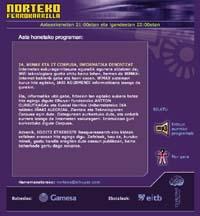Updated Solar System Mural
2007/01/01 Solabarrieta Arrizabalaga, Danel - Elhuyar Zientziaren Komunikazioa Iturria: Elhuyar aldizkaria

To conclude the debate on the existence or not of the planet Pluto, the International Union of Astronomers decided at the end of August 2006 what were the characteristics of planets and dwarf planets. Now our solar system consists of eight planets (Mercury, Venus, Earth, Mars, Jupiter, Saturn, Uranus and Neptune) and four dwarf planets (Ceres, Pluto, Charon and Eris).
Much has been said about this new classification in society and especially in the educational world. In this sense, the Elhuyar Foundation has edited a new mural of the solar system that collects the decisions made by the International Union of Astronomers.
The mural depicts all dwarf planets and planets. And next to the image, it offers data of number of satellites, diameter, mass, density, rotation, distance to the Sun, time that takes the light to reach the Sun, whether it has magnetic field or not and if it has ring.
Updated and real
Along with all of the above, it represents whether each body is a dwarf planet or planet and where it is located. In the case of dwarf planets, the Kuiper belt and asteroid belt have also been represented in these areas of the solar system.
these bodies are found. In these areas, however, there are thousands of other objects that, through their representation, have wanted to be highlighted in the image of the wall as an integral part of the solar system to offer a complete and real vision of the solar system.
Following the same objective, the mural also gives special importance to the representation of the scale. Therefore, a second solar system has been represented at the bottom of the wall image. In this second representation, dwarf planets and planets are located depending on the distance to the Sun and their relative size is shown. Thanks to this, at first glance you see how the solar system is and, for example, you realize how far Uranus and Neptune of the Sun are.
As for technical characteristics, the mural is 98 x 30 cm and has been designed and designed to be placed at home or in the classroom.





